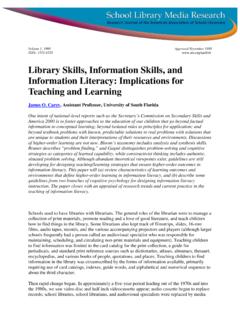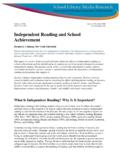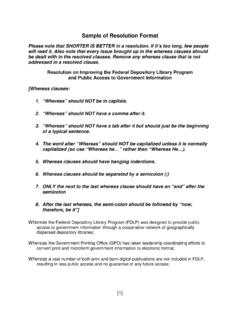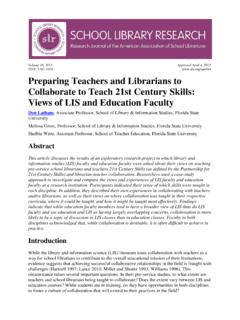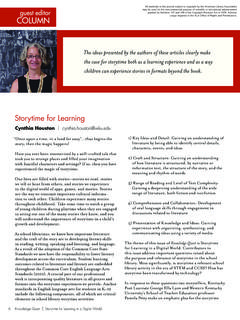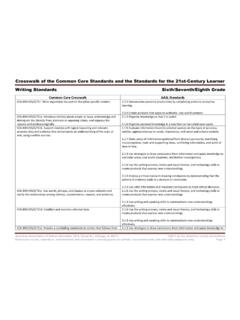Transcription of ACADEMIC LIBRARY CONTRIBUTIONS TO STUDENT …
1 ACADEMIC LIBRARY CONTRIBUTIONS . TO STUDENT SUCCESS: Documented Practices from the Field January 2015. Prepared by: Karen Brown Professor, Dominican University Graduate School of LIBRARY and Information Science Part of the project "Assessment in Action: ACADEMIC Libraries Contributor: and STUDENT Success" and made possible by a grant from Kara J. Malenfant the Institute of Museum and LIBRARY Services. ACRL Senior Strategist for Special Initiatives Citation: Association of College and Research Libraries. ACADEMIC LIBRARY CONTRIBUTIONS to STUDENT Success: Documented Practices from the Field. Prepared by Karen Brown. CONTRIBUTIONS by Kara J. Malenfant. Chicago: Association of College and Research Libraries, 2015. Published online at About the Authors Karen Brown is a professor at Dominican University (River Forest, Illinois) in the Graduate School of LIBRARY and Information Science and teaches in the areas of collection management, foundations of the profession, and literacy and learning.
2 Prior to joining Dominican University's faculty in 2000, she developed and coordinated continuing education programs for the Chicago LIBRARY System, one of Illinois's former regional LIBRARY systems. She has also held positions focusing on collection development, reference, and instruction at the University of Wisconsin, University of Maryland, Columbia University, and Bard College. She holds a PhD in media studies from New York University and master's degrees in LIBRARY science and adult education from the University of Wisconsin. Kara J. Malenfant is a senior staff member at ACRL, where she coordinates government relations advocacy and scholarly communication activities and is the lead staff member on the Value of ACADEMIC Libraries initiative and Assessment in Action program.
3 She provides consulting services on organization development and use of ACRL's standards for libraries in higher education. Kara began her position at ACRL in fall of 2005, after working for six years at DePaul University Libraries in Chicago. She holds a PhD in leadership and change from Antioch University and an MS in LIBRARY science from the University of Illinois at Urbana-Champaign. ACRL is a division of the American LIBRARY Association 2015 American LIBRARY Association Contents Executive Summary .. 1. Assessment in Action .. 1. Findings about LIBRARY CONTRIBUTIONS .. 1. Findings about Higher Education 2. More Information .. 2. About ACRL .. 2. Introduction .. 3. Institutional Teams: Year One .. 5. Assessment Approaches to Demonstrating LIBRARY Value.
4 7. LIBRARY Factors and Connections to STUDENT Learning and LIBRARY Instruction and General Education ..14. LIBRARY Instruction and High-Impact Education Practices ..15. LIBRARY Instructional Games ..15. Information Literacy and Multimedia Sources ..16. Flipped Classroom LIBRARY Instruction ..16. LIBRARY Space and LIBRARY Use of Social Media ..17. LIBRARY Leadership and Evidence-Based Advocacy ..18. Leadership within the LIBRARY ..18. Leading the Project Teams ..18. Forging Partnerships across the Campus ..20. Creating a Community of Practice for ACADEMIC LIBRARY Assessment ..20. Conclusion ..21. APPENDIX A: ACRL and the Value of ACADEMIC Libraries Initiative ..23. APPENDIX B: Final Report Template for AiA Team Leaders ..25. ACADEMIC LIBRARY CONTRIBUTIONS to STUDENT Success: Documented Practices from the Field Executive Summary 1.
5 ACADEMIC librarians are increasingly participating in the national dialogue about higher education effectiveness and quality. They are contributing to higher education assessment work by creating approaches, strategies, and practices that document the value of ACADEMIC libraries to advancing the goals and missions of their institutions. By demonstrating the variety of ways that libraries contribute to STUDENT learning and success, ACADEMIC librarians are establishing connections between different aspects of the LIBRARY ( , instruction, reference, space and facilities, and collections) and numerous ACADEMIC success factors ( , STUDENT retention, persistence, GPA, engagement, graduation, and career preparedness). Assessment in Action Over 70 higher education institutions from across North America recently completed team-based assessment projects that resulted in promising and effective approaches to demonstrating the LIBRARY 's value to STUDENT learning and success.
6 Assessment in Action: ACADEMIC Libraries and STUDENT Success (AiA) is a three-year project sponsored by the Association of College and Research Libraries (ACRL) in partnership with the Association of Institutional Research and the Association of Public Land-grant Universities, and with funding from the Institute of Museum and LIBRARY Services. When the project concludes in 2016, over 200 higher education institutions will have participated in developing assessment methods and tools. The methods and tools designed by the teams expand the resources that higher education institutions can share and use in their campus assessment initiatives. Many of the projects are replicable at other ACADEMIC libraries or contain elements that can be adapted to a college or university's unique institutional context.
7 Findings about LIBRARY CONTRIBUTIONS The findings from the assessment work of the first -year campus teams are impressive. Although these findings are not necessarily generalizable to all higher education institutions, they do point to important relationships between the LIBRARY and STUDENT learning and success. Higher education institutions are encouraged to advance and refine assessment work that focuses on the ACADEMIC LIBRARY 's CONTRIBUTIONS to an institution's mission and ACADEMIC priorities. A few examples of the project findings are highlighted below. 1. LIBRARY instruction builds students ' confidence with the research process. 2. LIBRARY instruction contributes to retention and persistence, particularly for students in first -year experience courses and programs.
8 3. students who receive LIBRARY instruction as part of their courses achieve higher grades and demonstrate better information literacy competencies than students who do not receive course-related LIBRARY instruction. 4. A LIBRARY 's research and study space fosters social and ACADEMIC community among students . 5. LIBRARY instructional games engage students , enhance information literacy skills, and increase positive attitudes toward the LIBRARY and its staff. 1. This executive summary is available online as a separate document, formatted to share broadly with campus stakeholders, see Page 1 ACADEMIC LIBRARY CONTRIBUTIONS to STUDENT Success: Documented Practices from the Field 6. The LIBRARY 's use of social media promotes awareness of the LIBRARY and builds ACADEMIC community among students .
9 7. Multiple LIBRARY instruction sessions or activities in connection with a course are more effective than one-shot instruction sessions. 8. Collaborative instructional activities and services between the LIBRARY and other campus units ( , writing center, study skills and tutoring services) promote STUDENT learning and success. Findings about Higher Education Assessment The experiences of the AiA teams led to several recommendations for fostering evidence-based demonstrations of LIBRARY value at higher education institutions. Six of the strategies are highlighted below. A more detailed discussion of the recommendations and strategies are available in the full report, ACADEMIC LIBRARY CONTRIBUTIONS to STUDENT Success: Documented Practices from the Field.
10 1. LIBRARY assessment is most effective when it aligns with institutional priorities and mission. 2. LIBRARY assessment that includes the participation of representatives from other campus departments and units ( , faculty, institutional research, ACADEMIC administration, STUDENT services) increases the quality of the assessment design and results. 3. Libraries can contribute important data about STUDENT learning and success to an institution's accreditation self-study and review. 4. A mixed-methods approach to LIBRARY assessment strengthens and enriches findings about LIBRARY impact. 5. ACADEMIC librarians recognize how assessment activities advance an institution's ACADEMIC mission and are poised to lead LIBRARY assessment initiatives. 6. Assessment achieves sustainability and meaningful integration with the LIBRARY 's services and programs when it is a designated responsibility of one or more librarians.
